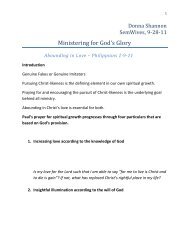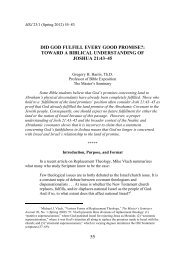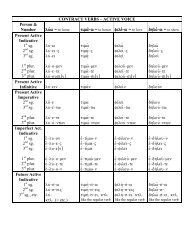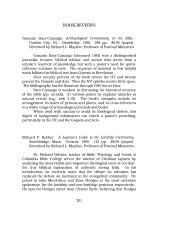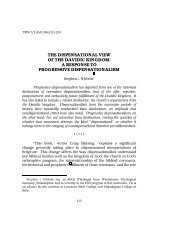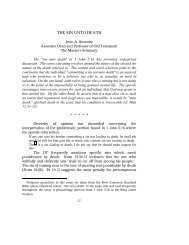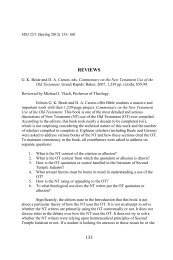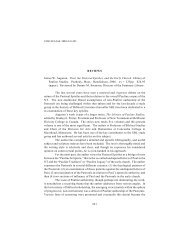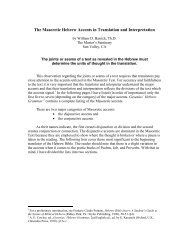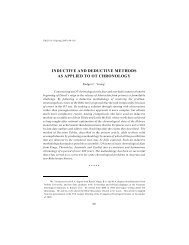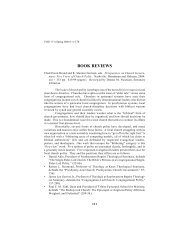dynamic equivalence: a method of translation or a system
dynamic equivalence: a method of translation or a system
dynamic equivalence: a method of translation or a system
- No tags were found...
Create successful ePaper yourself
Turn your PDF publications into a flip-book with our unique Google optimized e-Paper software.
168 The Master's Seminary JournalA Linguistic QuestionNida and other linguistic auth<strong>or</strong>ities are quite specific in telling translat<strong>or</strong>sto abide by the referential meanings <strong>of</strong> w<strong>or</strong>ds, meanings they identify with thosefound in standard dictionaries. 101 In Webster's Ninth New Collegiate Dictionary therelevant definition <strong>of</strong> the w<strong>or</strong>d "<strong>translation</strong>" is, "an act, process, <strong>or</strong> instance <strong>of</strong>translating: as a: a rendering from one language into another; also the product <strong>of</strong>such a rendering." 102 There is little doubt that, in the minds <strong>of</strong> most people whouse the English language, the term "<strong>translation</strong>" used in a cross-cultural connectionsuggests the simple idea <strong>of</strong> changing from one language into another. Yet this isonly one-third <strong>of</strong> the process <strong>of</strong> <strong>dynamic</strong> <strong>equivalence</strong>, the step that is called"transfer." 103 The question is then, "Is it proper linguistic practice to use the w<strong>or</strong>d`<strong>translation</strong>' to describe the product <strong>of</strong> a D-E exercise?" 104M<strong>or</strong>e recently, de Waard and Nida use "associative meaning" in lieu <strong>of</strong>"referential meaning" to describe lexical definitions. 105 They point out, f<strong>or</strong>example, the hesitancy <strong>of</strong> most <strong>translation</strong>s to use "Yahweh" because in the minds<strong>of</strong> many Christians, it has become associated with a modernistic attitude towardthe Bible and God. 106Should not the same precision be shown in use <strong>of</strong> the w<strong>or</strong>d "<strong>translation</strong>"?The use <strong>of</strong> "<strong>translation</strong>" to include implementation <strong>of</strong> all the principles <strong>of</strong>hermeneutics and exegesis reflects an insensitivity to the associative meaning <strong>of</strong>that w<strong>or</strong>d in the minds <strong>of</strong> most English-speaking people. Perhaps "commentary" istoo strong a w<strong>or</strong>d to describe a D-E product, but it seems that something such as"cultural <strong>translation</strong>" 107 <strong>or</strong> "interpretive <strong>translation</strong>" would be m<strong>or</strong>e in keepingwith principles espoused by linguistic auth<strong>or</strong>ities.An Ethical QuestionA closely related ethical question may also be raised: Is it honest to givepeople what purp<strong>or</strong>ts to be the closest representation <strong>of</strong> the inspired text in theirown language, something that intentionally maximizes rather than minimizes thepersonal interpretations <strong>of</strong> the translat<strong>or</strong> <strong>or</strong> translat<strong>or</strong>s?Graves has observed that every <strong>translation</strong> is a lie in the sense that there are101Nida, Toward a Science 70.102Webster's Ninth New Collegiate Dictionary (Springfield, Mass.: Merriam-Webster, 1988) 1254.103Glassman, The Translation Debate 61-63.104Glassman equates the verb "translate" with the verb "interpret" in his attempt to show the basicequality in meaning <strong>of</strong> "translate" and "paraphrase" (Glassman, The Translation Debate 61-63). Hisdefinition, however, is limited to the use <strong>of</strong> "translate" within the same language rather than its usein connection with different languages. He states his definition in a way that the noun "<strong>translation</strong>"is hardly ever qualified in general usage in connection with D-E. From the perspective <strong>of</strong> referentialmeaning, he fails in this regard to justify the use <strong>of</strong> "translate" in the senses <strong>of</strong> "interpret" <strong>or</strong>"paraphrase."105de Waard and Nida, From One Language 123-24.106Ibid., 142.107Kraft, Christianity in Culture 284-286.



